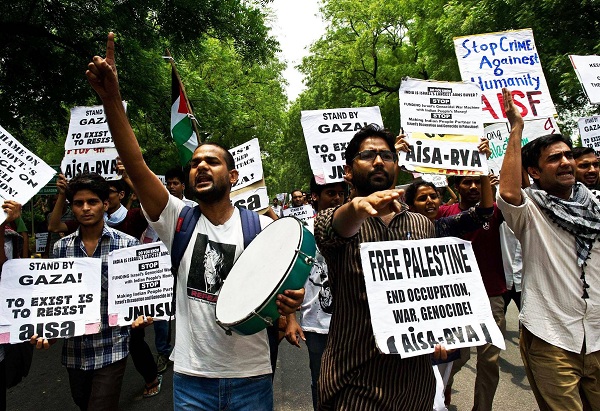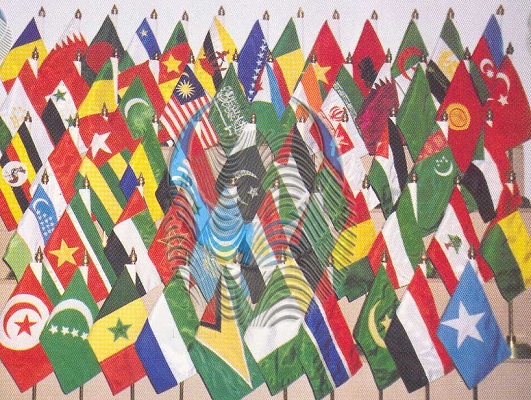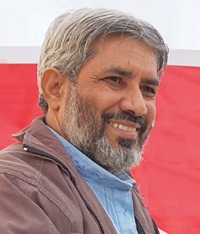
by Editor | May 25, 2021 | Muslim World
 Tehran : (IANS) Iran on Thursday signed a confidential oil agreement with France’s Total to develope the South Azadegan oil field shared by Iran and Iraq, Iran’s Oil Minister Bijan Namdar Zangeneh said.
Tehran : (IANS) Iran on Thursday signed a confidential oil agreement with France’s Total to develope the South Azadegan oil field shared by Iran and Iraq, Iran’s Oil Minister Bijan Namdar Zangeneh said.
Iran and the oil giant, Total, have agreed to keep the articles of the accord confidential, and the French firm is now “studying its participation in the development of the oil field,” Zangeneh was quoted as saying by Press TV.
Earlier this month, Zangeneh said that Iran and Total were in talks about the oil field, which is said to hold an in-situ oil reserve of about 33.2 billion barrels, according to the report.
Iran reached an agreement with the Japanese Inpex a decade ago to develop the oil field, however, the Japanese company quit the project as a result of U.S. sanctions against Iran’s energy sector because of the disputed nuclear issue.
Iran and the world powers clinched a nuclear deal in July last year which enables the country to re-engage with the world’s energy giants to develop its oil and gas fields.

by Editor | May 25, 2021 | Muslim World
 Jeddah, (IINA) – A recent report obtained by the International Islamic News Agency (IINA) on Sunday revealed that the number of the displaced people and refugees in member states of the Organization of Islamic Cooperation (OIC) during the year 2014 stood at 17,073,686 while compared to 12,693,075 in 2013, an increase of 34.5 percent with 4,380,611 more people.
Jeddah, (IINA) – A recent report obtained by the International Islamic News Agency (IINA) on Sunday revealed that the number of the displaced people and refugees in member states of the Organization of Islamic Cooperation (OIC) during the year 2014 stood at 17,073,686 while compared to 12,693,075 in 2013, an increase of 34.5 percent with 4,380,611 more people.
The report, published by the Islamic Cooperation Humanitarian Affairs Department (ICHAD-OIC), showed that this increase is an outcome of 45 crises and disasters that hit 27 member states including minorities in Myanmar and Central Africa. It also noted that some of those crises and disasters are still ongoing.
The report stated that 16 crises and wars occurred in 14 member states as well as in countries where Muslim are minorities such as Myanmar and Central Africa, have dislodged 15,703,259 refugees and displaced, while 1,370,427 were dislodged from 29 natural disasters occurred in 19 member states, in addition to Myanmar and Central Africa.
According to the ICHAD, Syria topped the number of refugees with an increase of 38.07 percent and now stood at 6.5 million, followed by Iraq’s 14.86 percent which stood at 2.53 million refugees, Nigeria 7.03 percent with 1.2 million, Somalia 6.44 percent with 1.1 million and Pakistan by 5.21 percent with 890,000 refugees.
The report also showed that more than 702,000 Muslims in Central Africa and 146,000 Muslims in Myanmar were dislodged as a result of crises and disasters.
The report highlighted that the number of displaced people because of crises rose to 15.73 million during 2014, which is 92 percent of all dislodged people, compared to 8.43 million in 2013, which was 66.4 percent of dislodged people in the previous year, while the number of displaced people by results of natural disasters dropped to 1.37 million during 2014, which is 8 percent of all dislodged people, compared to 4.24 million in 2013, which was 33.6 percent of dislodged people in the previous year.
Also, ICHAD predicted a further increase in number of this category, because of crises that surround member states such as Syria, Libya, Iraq, Yemen, Nigeria and other states, which are worsening the situation even more, calling for the need to strengthen the humanitarian aid system.
It was suggested in the report that OIC member states can further improve their performance in humanitarian aids through platforms that promote cooperation among the Islamic countries and humanitarian organizations.
ICHAD said that such platform will act as a mechanism to facilitate the development of common visions and strategies to face the humanitarian crises and disasters that are occurring member states, and that it will contribute to the advancement of humanitarian work in the Islamic World.

by Editor | May 25, 2021 | Entrepreneurship, News, Social Entrepreneur

Abdul Rashid Agwan
By Abdul Rashid Agwan
The Muslim Community is also bestowed with the specialty of Islamic social finance, based on such philanthropic institutions as Zakah, Saqdah and Awqaf, which is used and can also be effectively developed further for the alleviation of poverty in the Muslim world and also for addressing other social needs.
In this regard, a document published by the Islamic Research and Training Institute of IDB, in collaboration with Thomson Reuters, provides valuable information and in-depth analysis of a block of countries with sizable Muslim population. The said research work, Islamic Social Finance Report 2014, compiles and analyzes data regarding the state of Islamic social finance in Indonesia, India, Pakistan, Bangladesh, Malaysia, Singapore and Brunei Darussalam with an aggregate 45% of the Muslim population in the world.
According to the report, Zakah collection in these countries was like this: Indonesia $231.6 million (in 2012), India $1.5 billion (projected), Pakistan $105 million (in 2011), Malaysia $457 million (in 2011), Singapore $20.4 million (2012) and Brunei Darussalam $13.8 (2010). Thus, an amount of approximately $2.3 billion is being collected under the head of Zakah in these countries. This amount is generally used for the need-based help of poor and destitute, and also for the education and treatment of needy people. In India, a large share of the amount goes to the religious education of poor students studying in Islamic seminaries.
It has been noted from the World Bank Report 2009 that “although the share of South Asia’s poor people in Global poverty declined from 59.4 percent to 40.3 percent during 1981 to 2005, yet absolute number of poor people increased from 548 million to 596 million during the same period.” Thus, the situation is becoming acuter in spite of suitable measures and the Islamic social finance can be effectively used to meet the future economic challenge before the Muslims of the region.

Nasim Shah Shirazi and Md. Fouad Bin Amin have estimated that in 38 Muslim countries, leaving aside some rich ones, the potential of Zakah collection is in the order of $100 billion. The chairman of the Islamic Chamber of Commerce and Industry and a prominent Saudi businessman, Saleh Kamel, has estimated two years back that the total value of Zakah in Saudi Arabia should be SR1 trillion, i.e. around $270 billion. From the referred studies, it appears that Zakah potential of the Muslim community can be presumed as more than $400 billion from the present estimates and, if this amount is properly collected and distributed, it can remove many woes of the community, especially the rampant poverty in some Muslim countries and also in those where Muslims are in minorities.
In India, where 170 million Muslims comprise 14% of the population and face many kinds of hardships, the total Waqf properties are valued at $20 billion which can help the community in solving its critical problems such poverty, illiteracy and unemployment, provided they could be properly utilized. It is a matter of satisfaction that the Zakah management and the Waqf development have become serious social initiatives in many parts of the world for quite some time.
[Passages from Abdul Rashid Agwan’s latest book, Islam in 21st Century: The Dynamics of Change and Future-making]

 Tehran : (IANS) Iran on Thursday signed a confidential oil agreement with France’s Total to develope the South Azadegan oil field shared by Iran and Iraq, Iran’s Oil Minister Bijan Namdar Zangeneh said.
Tehran : (IANS) Iran on Thursday signed a confidential oil agreement with France’s Total to develope the South Azadegan oil field shared by Iran and Iraq, Iran’s Oil Minister Bijan Namdar Zangeneh said.


